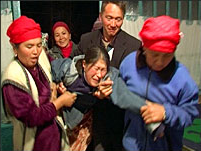To begin with for hundreds of years Kyrgyzstan was an isolated country in the mountains of Central Asia located along the Silk Road. It has borders with Kazakhstan to the north, Uzbekistan to the west, Tajikistan to the southwest, China to the southeast and east. Moreover, as a former republic of the old USSR, it was rarely visited by outsiders since its independence in 1991Kyrgyzstan has begun opening up and because a strange local custom has been rediscovered.
In a small village in the countryside outside the city of Osh, a wedding is about to begin. As a result, family and friends are busy preparing for the occasion and the groom admits to being nervous. In addition, it seems that he has had some problems finding himself a bride but he is optimistic that ‘this one will say yes.’
At last she arrives, she is manhandled into her hosts’ house, in tears and this is because she is clearly in distress. The girl’s name is Norkuz she is a ‘kidnapped bride’.
Norkuz has been kidnapped from her home a few miles away by the groom’s brother and some of his friends. She is lead into a large open room by the women of the family who are simultaneously forceful and comforting. Besides, they tell her that they too were kidnapped brides and that she should be grateful as she is already over 25 which is considered in rural Kyrgyzstan to be ‘over the hill’.

Norkuz resists, she is told by her abductors that due to the negotiations for the marriage have already been agreed between her brother and the groom, she cannot break the agreement.
An hour later, Norkuz is resisting less and although obviously very tired, but she is at least laughing with the women who by now have placed a scarf on her head. It is because the custom dictates that once the ‘bride-to-be’ accepts the ceremonial headscarf, then the wedding can begin. In the end, Norkutz relents.
Although bride kidnapping was traditionally a very commonly practiced custom but its origins are unclear. Furthermore, it was banned during the Russian occupation and has officially been illegal since 1994, the authorities rarely enforce the law. Recent figures suggest that close to a third of indigenous Kyrgyz women in Kyrgyzstan may have been forced into nonconsensual weddings.
Four months after their wedding. Norkuz and her new husband stand, hand-in-hand, giggling outside their home in the snow. More importantly Norkuz is already two months pregnant.
“Since I have a husband so I am not alone anymore. Now we can take care of each other and dream together.”
Last but not least for his part, the groom is very satisfied. "I’m happy, she’s happy, our families are happy. What else matters," he says.
Reprinted with permission from http://www.pbs.org/frontlineworld/stories/kyrgyzstan/